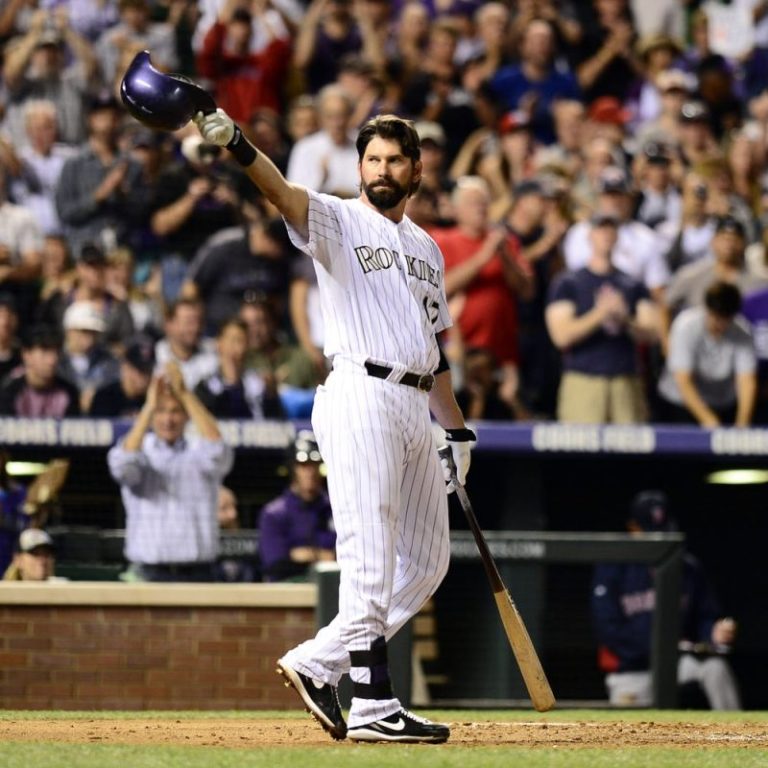An incredibly talented all-around athlete, Todd Helton holds the title of the greatest player in Colorado Rockies history – playing all 17 of his major league seasons in Denver and racking up over 2,500 career hits.
He’s the franchise’s all-time leader in games played, hits, runs, homers, RBI and Wins Above Replacement.
But another part of his legacy is that he conjures up such an interesting game of “what if?”
A football and baseball star at the University of Tennessee, Helton rose up the depth chart to take over as the Volunteers’ starting quarterback his junior year. If not for a knee injury that turned the job over to a freshman named Peyton Manning, Helton might’ve positioned himself for a pro career in the NFL instead of one in MLB.
The other twist of fate came when he was selected in the first round of the 1995 draft by the Rockies. Helton reached the major leagues two years later and never left Colorado until his retirement following the 2013 season.
He finished with a .316/.414/.539 slash line, hitting 369 homers with 1,401 runs scored and 1,406 RBI.
But would Helton have been as great a player if he hadn’t played all his home games 5,280 feet above sea level? It certainly helped bolster his numbers.
There lies the essence of Helton’s Hall of Fame case. Was he a great player because of – or in spite of – his hitter-friendly home?
Why Helton belongs in the Hall
The lefty-swinging first baseman was outstanding both at the plate and in the field.
He has the rate stats and the career totals to support his inclusion in Cooperstown – with a career batting average above .300, on-base percentage above .400 and slugging percentage above .500. In addition, he collected over 2,500 hits, 1,400 runs and RBI, and 300 homers. Of the nine other players in MLB history to reach all seven of those marks, only Manny Ramirez isn’t already a Hall of Famer.
For a five-year period from 2000-04, Helton was one of the absolute best players in baseball. He was named to the NL All-Star team each of those seasons – winning four Silver Sluggers, three Gold Gloves and a batting title along the way. His 37.5 Wins Above Replacement over that span ranked third in the majors behind only Barry Bonds and Alex Rodriguez.
With 61.8 career WAR, Helton falls just below the average of the 24 first basemen in the Hall, but ahead of inductees Harmon Killebrew, Bill Terry and Hank Greenberg.
Where Helton falls short
The most common argument against Helton is that Coors Field turned him from a good hitter into a great one. While he did have much better stats at home – his 193-point home/road OPS difference is one of the highest in history – the constant adjustments players must make when going from altitude to sea level have a negative impact.
Helton’s career peak also wasn’t as sustained as many other Hall of Famers’. Although he was runner-up (to Kerry Wood) in the balloting for NL Rookie of the Year in 1998, Helton’s Silver Slugger and Gold Glove seasons were all concentrated between 2000 and 2004.
The lack of postseason resume also works against Helton. The Rockies made the playoffs only twice during his career – and in those games, he hit just .211/.303/.281 with no home runs in 57 at-bats.
Voting trends
Helton has made steady progress since becoming eligible for the Hall in 2019. He is currently above the 75% threshold of the 167 ballots on Ryan Thibodaux’s Hall of Fame tracker with 79% support.
2019: 16.5%2020: 29.2%2021: 44.9%2022: 52.0%
Will Helton ultimately get elected?
Just like his career, Helton continues to build on some already-impressive numbers. His vote total from last year was the second-highest among the returning candidates. And from the ballots already revealed this year, Helton’s 27-vote increase from returning voters is the most of anyone.

